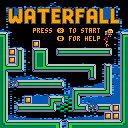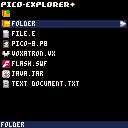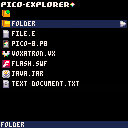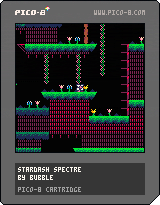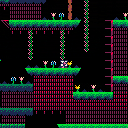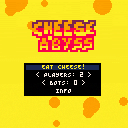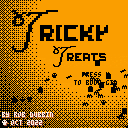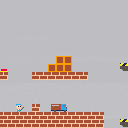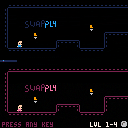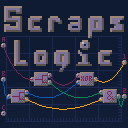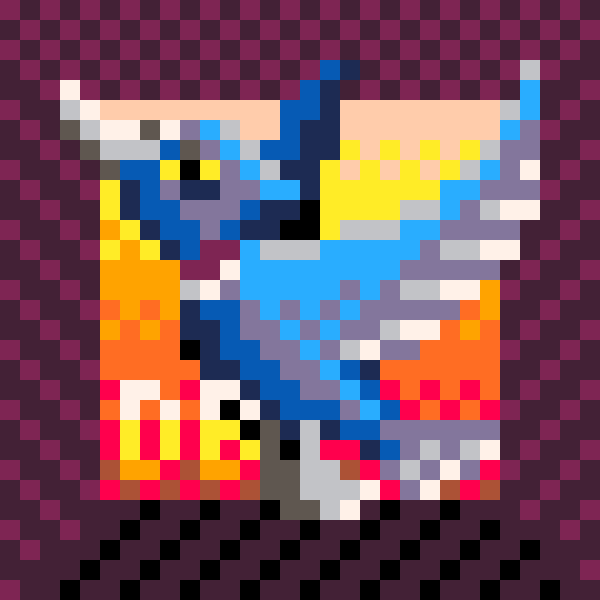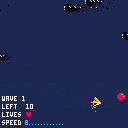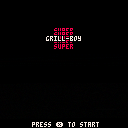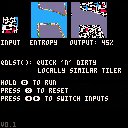When I'm making games or tweetcarts, I often adjust numbers just a tiny bit, then rerun the whole game. e.g. I change the player speed by 0.1, then change it back, then try 0.05...
This is a bit slow, so here's a library I made to help me do it faster. I also find it useful for analyzing other people's tweetcarts -- if I can easily adjust the values they use, I can quickly figure out what they mean
setup
load #twiddler- copy the
knobs.lua+helperstabs into your game - use
kn[1],kn[2], ...kn[8]in place of any number - add
twiddler()to the end of your_drawfunction
Now, run your code:
- press tab and adjust the values (see "controls" below)
- press tab again -- the values will be copied to your clipboard
- paste the values into the start of your code to save them
example 1
Start with a tweetcart you want to study. For example, this one by 2DArray: https://twitter.com/2DArray/status/1492566780451205120
[ [size=16][color=#ffaabb] [ Continue Reading.. ] [/color][/size] ](/bbs/?pid=119729#p) |
recently, while investigating the pico-8 preproccesor, i found some really weird behaviour, which culminated in some very strange token optimizations, and an infinite token exploit
Arithmetic assignment save
often, you want to perform multiple arithmetic operations on a varible, then assign it to itself. for example, a=2*a+1
the 2 ways you'd do this normally in pico-8
are
a=2*a+1 -- 7 tokens a*=2 a+=1 -- 6 tokens |
however, using preproccesor trickery, we can reduce it even more:
a*=2 +1 -- 5 tokens |
the reason this works is because the preprocessor patching for += works line-wise, so this would be patched to
a= a*(2) +1 |
Infinite token exploit #1
this exploit allows you to run any code that is on 1 line, and doesn't use any pico-8 preproccesor based syntax extensions (i.e. +=, shorthand if, ?), while only costing 8 tokens
it works as follows:
a={}
a["[t"]+=" < your code here > t(
[ [size=16][color=#ffaabb] [ Continue Reading.. ] [/color][/size] ](/bbs/?pid=119789#p) |







PICO-EXPLORER is like the file explorer but it uses its own file system
Something to be added
v0.4
- Now the file order automatically changes when a file is deleted
- Changed the information bar's colour from dark blue to black
v0.3
- Fixed bug that called an error when you try to select the next file after the last one
- Added the ability to open .txt files
- Added the ability to close opened window (in pause menu)
- Added the ability to remove files (in pause menu)
- Added the "removing" sound


How many people can play and have fun together on a single keyboard, in realtime? This experiment resulted in 6 players-game. Each of the heroes uses 1 keyboard button to chew through the cheese and other enemies.
Pick your key. Embrace yourself. Concentrate. Eat the cheese and the opponents!
It's a late upload - the game was made for Grawitacja Game Jam in 2019.

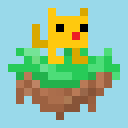
Well, I did it: I started a Halloween pico game the week before Halloween. It started as a talking Jack-O-Lantern puppet and it still kind of is that, but also there's a game included now!
HOW TO PLAY
- Try to feed the pumpkin, who fair warning is kind of a finicky eater.
- Press left and right arrow keys to pick up objects with your pumpkin-y hands. Release to fling them into your grinning maw.
- Press the down arrow to slow your hellish steed and get more stuff.
- Press X to commune with this demonic gourd.
- Press Z to waggle your eyebrows.
Feedback welcome, I'd like to add some music and hope to keep tweaking this until the big day.
UPDATE 10/30: On the eve of Halloween, I've added music, tweaked the game loop, and allowed you to slow down your freaky horse to collect more garbage to eat. Release soon!

I mourn the passing of @Xeonic's account in this board.
(SIGH)
Just recently I noticed ALL of her (his) posts, even the very smart and intelligent ones written regarding programming and hardware were utterly deleted because - well, she (he) went thermonuclear.
Folks, we're here to help. If there is a problem, please, let us try to work out with exceptional communication, intelligently, sensibly, and with great forethought and compassion. Please let us not ever have this happen again ...






This simple demo is an attempt to create a small platform game engine for my future projects.
As a beginner in pico-8 development, I made this demo by mixing various parts from other projects, like Jelpi, video tutorials by Nerdy Teachers, and other games found on the lexaloffle website.
So it's easy to find more than one type of implementation of collision detection, actor definition/creation, and so on.
But the main reason I'm sharing this demo is to help people see another project using the code developed by Steed in his engine for platforms and crates cratesncrushers: https://www.lexaloffle.com/bbs/?tid=35086.
First, I tried to develop my own version without using his code, but unfortunately this became an overwhelming task.


Hi everyone!
I have finally found time to improve and finish the game "Swapply" I made for the Ludum Dare 51.
It now features 4 levels, a save system and some collectibles.
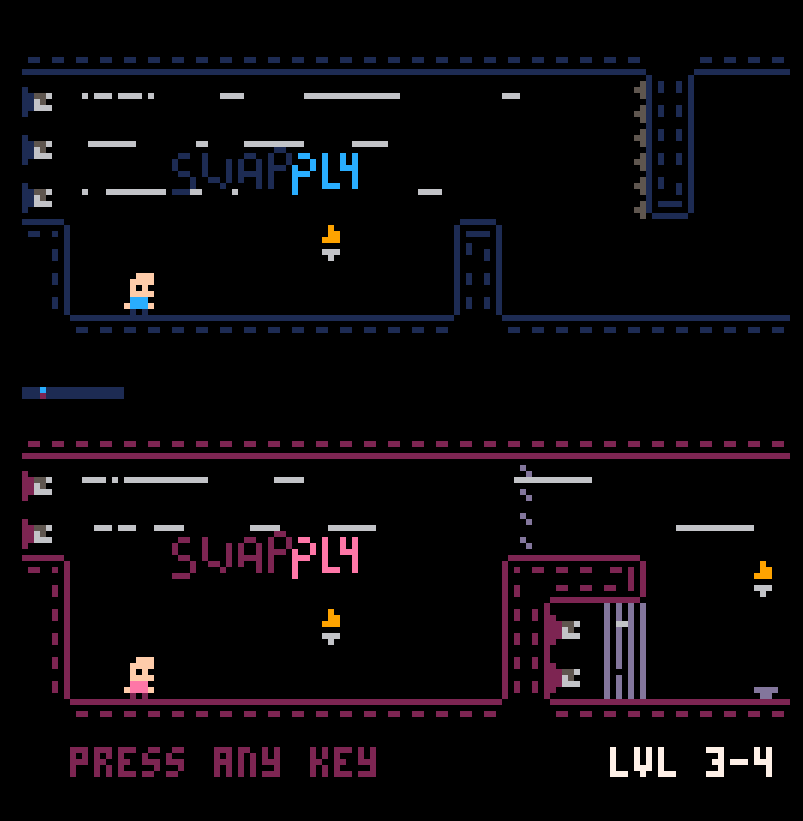
There is also a special end screen if you manage to complete the game :-)
The level design might be a bit tricky right now because I need to see some players testing the game in order to improve it and fix.
So feel free to send me any comments or screenshots if you are in trouble while playing!
Thank you very much and have a very nice day.
- Pierre




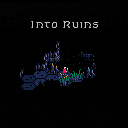
Reach depth 16 and retrieve the Wings of Yendor
Controls
(◀)(▶)(▼) : Turn
(▲) : Step forward / Attack / Interact
(X) : Open inventory
(O)/Z/C : Wait 1 turn
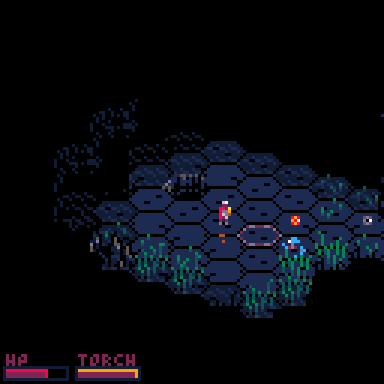
Into Ruins is a roguelike for the PICO-8 Fantasy Console.
There are no stairs. Jump down holes in the ground to make your way to the bottom. You will encounter natural cave formations, crumbling dungeon rooms, and terrifying creatures on your way.
There are no doors. Tread carefully or the creature in the next room might spot you. Light helps you explore more easily, but also reveals you to your foes. Fires can spread wildly through the environment, while glowing mushroom spores can mend your wounds.

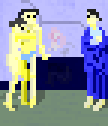

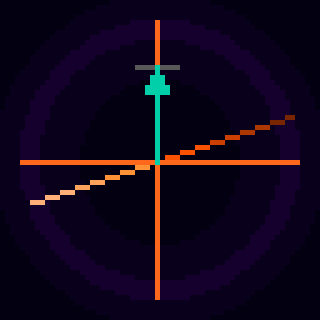



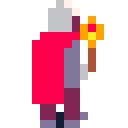

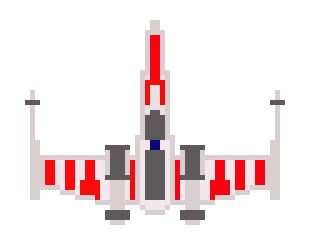
It's not intuitive that these two blobs of code have different token costs, even though they do exactly the same thing:
local a = 1 -- 3 tokens: a, =, 1 local b -- 1 token: b b = 1 -- +3 tokens b, =, 1 -> total 4 tokens |
I think the disconnect here is that the b in local b is being treated in the cost analysis as a variable reference, which it isn't, because the variable isn't referenced or assigned. It's just forward-declaring a conceptual attribute of the variable (its name), like the zero-cost local keyword does (its scope).
The reason why this bothers me is that I often find myself doing stupid stuff so I can do tuple assignments to save a token, which makes my code ugly. Gross stuff like re-using existing vars or function args, rather than declaring a new local, so I can put them all on the same tuple-assigning line without having to split out a new token-stealing "local" declaration that wouldn't work inline with the tuple assignment.

Scraps Logic
Use logic circuits to resolve open-ended puzzle in a post-capitalist society.
How to play :
⬆️⬇️⬅️➡️ or mouse to move the cursor.
❎ or left click to grab or drop a module or a cable:
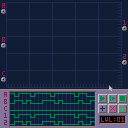
❎ or left click on a socket to plug or unplug a cable :
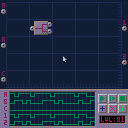
🅾️ or right click to remove the module or cable currently held :
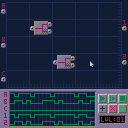
You can access the tutorial at anytime during a puzzle using the pause menu.
Truth Table and Cheat Sheet :
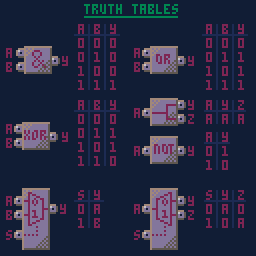
AND : Output 1 if both inputs are 1.


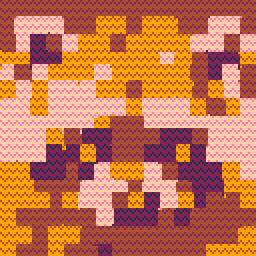

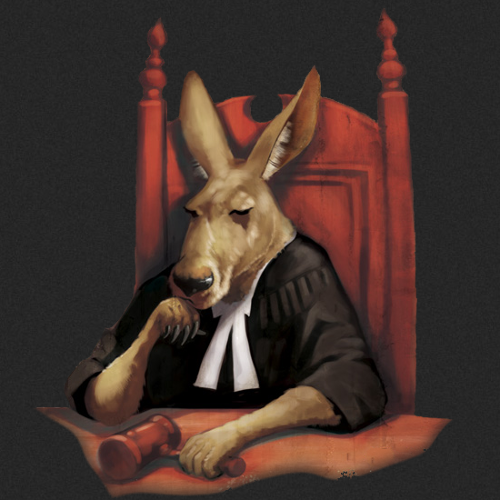



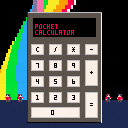
Welp, here's my first "big" project! I knew immediately after bikibird released Speako-8 that I would have to make something with it, and so I decided to make it a tribute to a certain departed musical legend and fellow speech synthesis nerd. (Also THANKS SO MUCH to bikibird for helping out with playtesting and debugging a LOT of it)
That said, I'm not sure how well it will run online or on other people's machines, so if anything's buggy or could be improved, feel free to let me know!



In this game, you're a cute little paper plane who flies around, collects red dots, and avoids bombs! There's high scores, a rainbow trail, and a few short tracks to fly around to. Have fun!
This was made at Squiggly River's October 2022 Camp Jam. If you're in Brisbane, Australia, come check us out!
I originally intended for this to be a tweetcart or a 1kjam submission, so that's why it uses labels and a whole bunch of gotos instead of _draw and _update😅
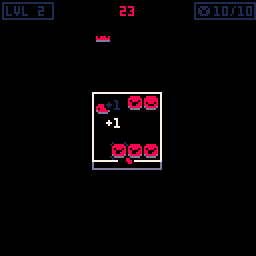
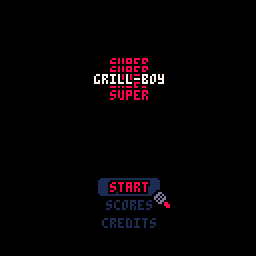
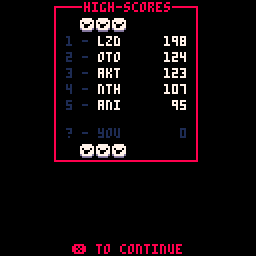
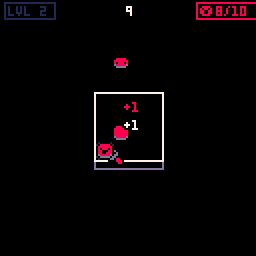
Controls
❎ to flip
⬅️➡️⬆️⬇️ to move spatula
Rules
The meat needs to be grilled! But who will grill it? YOU! But, can you handle the heat of all 10 levels?!
The burgers have two sides, when one side is cooked, it turns from white to red, flip the burgers until they have a big wide smile, but be careful the heat gets turned up little by little every level. Will you be able to make it to the Grill Boy hall of fame?
Behind The Scenes
(THIS IS NOT AN AGBIC ENTRY)
A few weeks ago I had just released, "Shoot Em' Doot Em", and was thinking about a project to do next. I sat outside facing the setting sun. And remembered something...




Recently, I've been futzing around with the wave function collapse algorithm. The original WFC is a titch heavy for PICO-8, so I've been experimenting with shortcuts and hacks to make something small and light enough to be practical in a PICO-8 game.
It's still quite early in development: it's optimized for readability, not compactness, there's probably more performance I can get out of it, and I'm pretty sure I have an off-by-one error lurking somewhere. All that said, it's giving interesting, useful results so far!



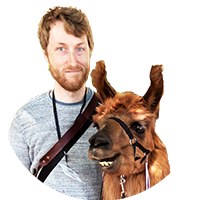

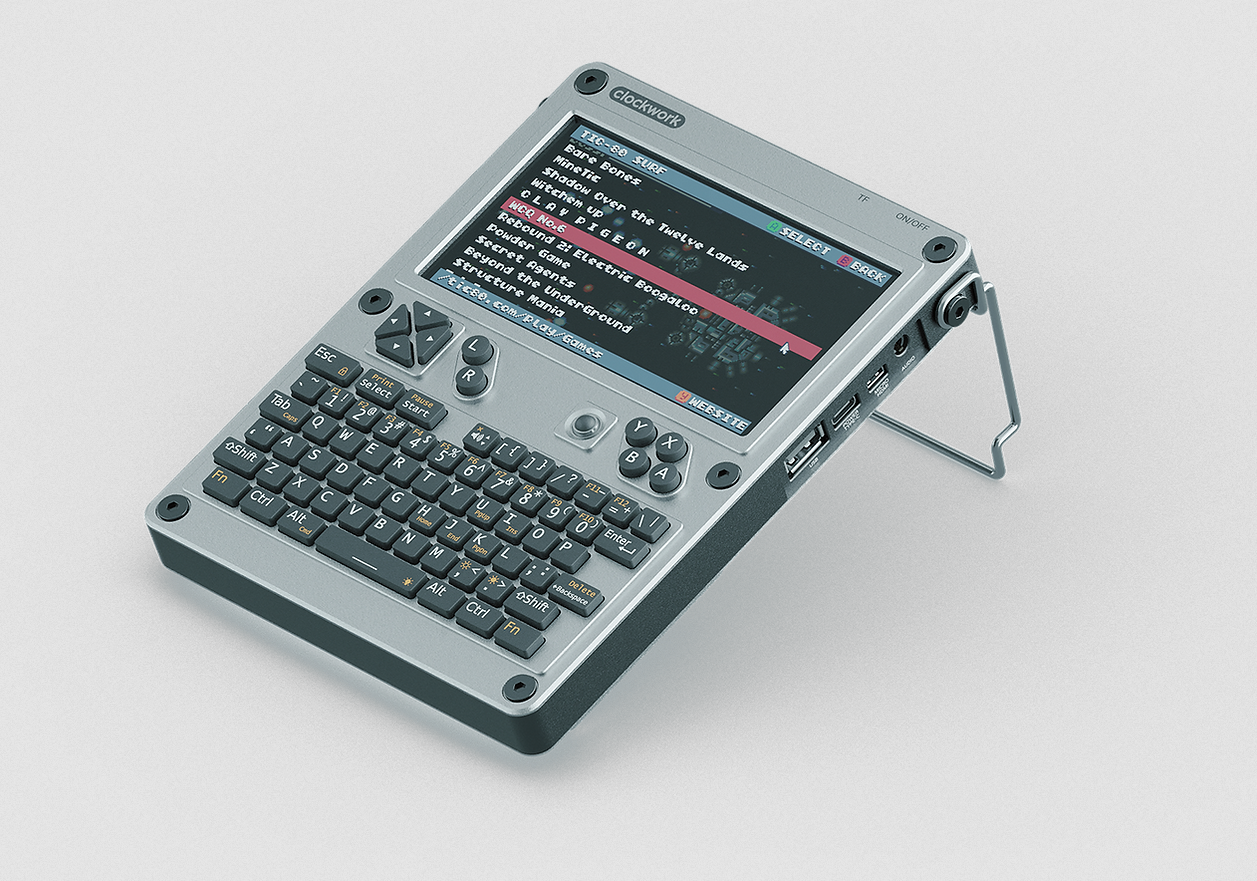
Their DevTerm got middling reviews, if I recall correctly. This one has an all-metal body and maybe will fulfill the promises that the PocketCHIP couldn't keep? Pico-8 (and fantasy consoles in general) is explicitly noted as one of the use cases.
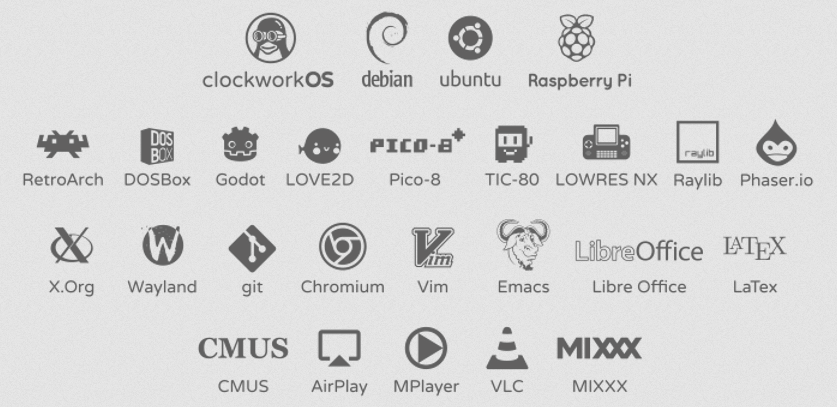
At any rate, I know there's a subsection of Pico-8 users looking for "the perfect portable device." I'll be curious to see reviews on this.














 1 comment
1 comment
